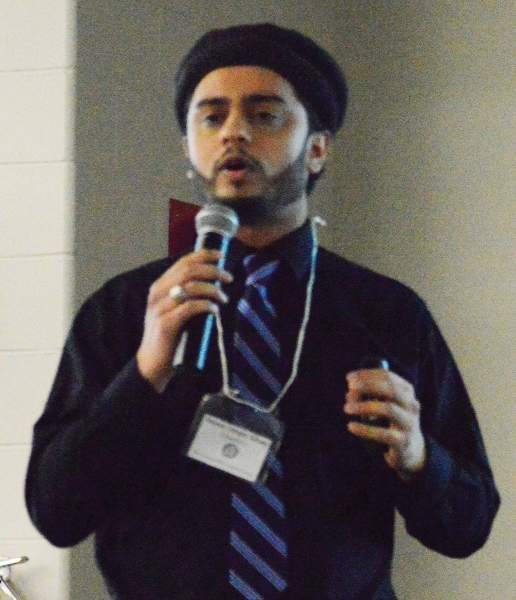They were just two guys from Calgary but each took separate, radically different paths after graduating from high school.
But one became a suicide bomber while the other is trying to promote peace.
On the one hand, there's Maulana Umair Khan, an Islamic studies and theology graduate from Jami'a Ahmadiyya (Islamic University) in Toronto who works with youth groups and spends time organizing events aimed at promoting interfaith dialogue.
He was in Olds on Nov. 18 for the eighth World Religions Conference, held at Olds College's Alumni Centre, where speakers representing atheist, Christian and Ahmadiyya Muslim Jama'at world views discussed religion's role in peace and conflict.
Khan serves as an Imam for the Ahmadiyya Muslim Jama'at, an Islamic denomination which hosted the conference.
“Our main purpose for doing these events is to highlight the beauties of all religions. At the same time, with everything happening related to Islam around the world, we feel it's a huge opportunity for us to remove people's misunderstandings that they have,” Khan said.
But then there was Salman Ashrafi, a suspected suicide bomber killed fighting for the Islamic State of Iraq and Syria (ISIS), reportedly behind 19 deaths and more than 40 injuries during an attack in Iraq last November.
Khan met Ashrafi in 2000, during his Grade 10 year at Calgary's Sir Winston Churchill High School.
“He was just normal. (We were) guys that grew up in Calgary, go out, have food, play sports, go to each other's houses,” Khan recalled.
During a meeting in his post-secondary years, he remembered Ashrafi as being non-religious. That was shown by the fact he had no qualms about drinking alcohol.
Khan last saw his former classmate four years ago.
“Next thing I knew, he was just on the news,” he said.
A year after his death, Khan is still trying to figure out how Ashrafi, a University of Lethbridge graduate with a job in the energy sector and plenty to live for, allegedly left it all to car-bomb an Iraqi military base.
“He had a wife, he had a family, he had a good job in downtown and all that,” he said.
“He had his times when he could get pretty intense in conversations and arguments and stuff, but other than that, we were all shocked.”
According to Khan, Ashrafi had “marital problems” that pushed him toward extremism. He was encouraged all the more to go down that route by a group he hung out with that was known for holding radical views and had isolated itself from the broader Muslim community.
“I guess they were just feeding off each other, right,” he said.
In the Qur'an, there is a person called the Khalifa, a prophet's spiritual successor whose authority is a reward for a Muslim's good character and deeds.
Two men today claim to hold that title and one of them is ISIS leader Abu Bakr al-Baghdadi, Khan said.
The other is Mirza Masroor Ahmad, the spiritual head of the Ahmadiyya Muslim Jama'at who has condemned extremism and has written multiple letters to world leaders urging them to prevent war.
“You can look at their works and decide for yourself who is doing peaceful efforts in trying to promote peace in the world and which community comes under that category of the Holy Qur'an,” Khan said.
Mirza Ghulam Ahmad, founder of the Ahmadiyya Muslim Jama'at, taught that the concept of Jihad is not a holy war but a struggle to please Allah with good works and at its highest level, is fought through the pen.
Educating youth is the best way to combat extremism, Khan said, adding that his group has been sharing methods with other Muslim communities trying to do so.
Khan was asked if Muslims ever tire of having to defend themselves whenever reports of terrorism surface.
“I can see why we have to say that right now,” he said, adding that in time, people will accept them as peaceful citizens.
“I think Muslims are the most disturbed by news like that because they're like, ‘you're making us look so bad'.”
Following the shootings in Ottawa, a mosque in Cold Lake was vandalized only to have the town community repair windows and scrub off hateful graffiti.
An incident like that showed how much easier it is to be a Muslim in Canada versus other countries, Khan said.
“We as Muslims, we're like, ‘wow that's amazing. That's the love and character that Canadians have'.”



